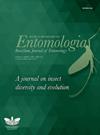龙葵科野生和栽培龙葵科新紫锥虫(鳞翅目:蕨科)的发育与存活
IF 0.7
4区 农林科学
Q4 ENTOMOLOGY
引用次数: 1
摘要
摘要小型番茄蛀虫秀丽隐氨酸新千层虫是番茄、茄子、辣椒、红茄等具有重要经济价值的野生栽培茄科害虫。我们比较了秀丽隐杆线虫在栽培和野生茄科植物中作为替代宿主在没有番茄植物的情况下的发育、存活和繁殖。寄主植物对发育时间有显著影响,以茄子为食的幼虫发育时间较长。以番茄和茄子为食的幼虫未成熟阶段的存活率较高,尽管所有宿主的发育周期都已完成。雌性也受到寄主植物的影响,当幼虫以猩红色茄子和野生茄科茄(jurubeba)为食时,雌性较低。菊芋的净繁殖率较低,茄属植物的固有生长率较高。结果表明,在冬秋季番茄间作过程中,两种野生茄属植物都可以作为秀丽隐杆线虫的替代寄主,从而可能成为栽培物种感染的幼虫库。大量宿主能够维持秀丽隐杆线虫的发育,这是另一个因素,加上世界气候变化,增加了秀丽隐杆虫对番茄生产国的入侵潜力。本文章由计算机程序翻译,如有差异,请以英文原文为准。
Development and survival of Neoleucinodes elegantalis (Lepidoptera: Crambidae) on wild and cultivated solanaceae
ABSTRACT The small tomato fruit borer Neoleucinodes elegantalis is a pest of wild and cultivated solanaceous of economic importance, such as tomatoes, eggplant, peppers and scarlet eggplant. We compared the development, survival and reproduction of N. elegantalis in cultivated and wild Solanaceae as alternative hosts in the absence of tomato plants in the field. The development time was significantly affected by the host plant and was longer in larvae feeding on eggplant. Survival of the immature stages was higher in larvae fed on tomato and eggplant, although the development cycle was completed in all hosts. Fecundity was also influenced by the host plant and was lower when the larvae fed on scarlet eggplant and the wild solanaceae Solanum paniculatum (jurubeba). The net reproductive rate was lower in jurubeba and the intrinsic growth rate was higher in Solanum sp. The results show that both wild Solanum species can act as alternative hosts for N. elegantalis during the intercropping of tomato in winter and autumn and may thus act as larval reservoirs for infestations on cultivated species. The large number of hosts able to sustain the development of N. elegantalis is another factor, together with world’s climate changes, to increase the invasive potential of N. elegantalis into tomato-producing countries.
求助全文
通过发布文献求助,成功后即可免费获取论文全文。
去求助
来源期刊
CiteScore
1.50
自引率
12.50%
发文量
14
审稿时长
6-12 weeks
期刊介绍:
Information not localized

 求助内容:
求助内容: 应助结果提醒方式:
应助结果提醒方式:


